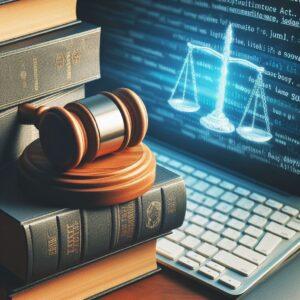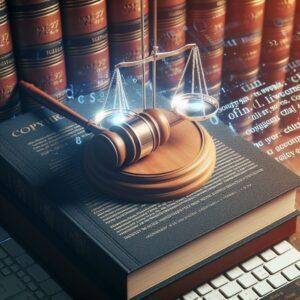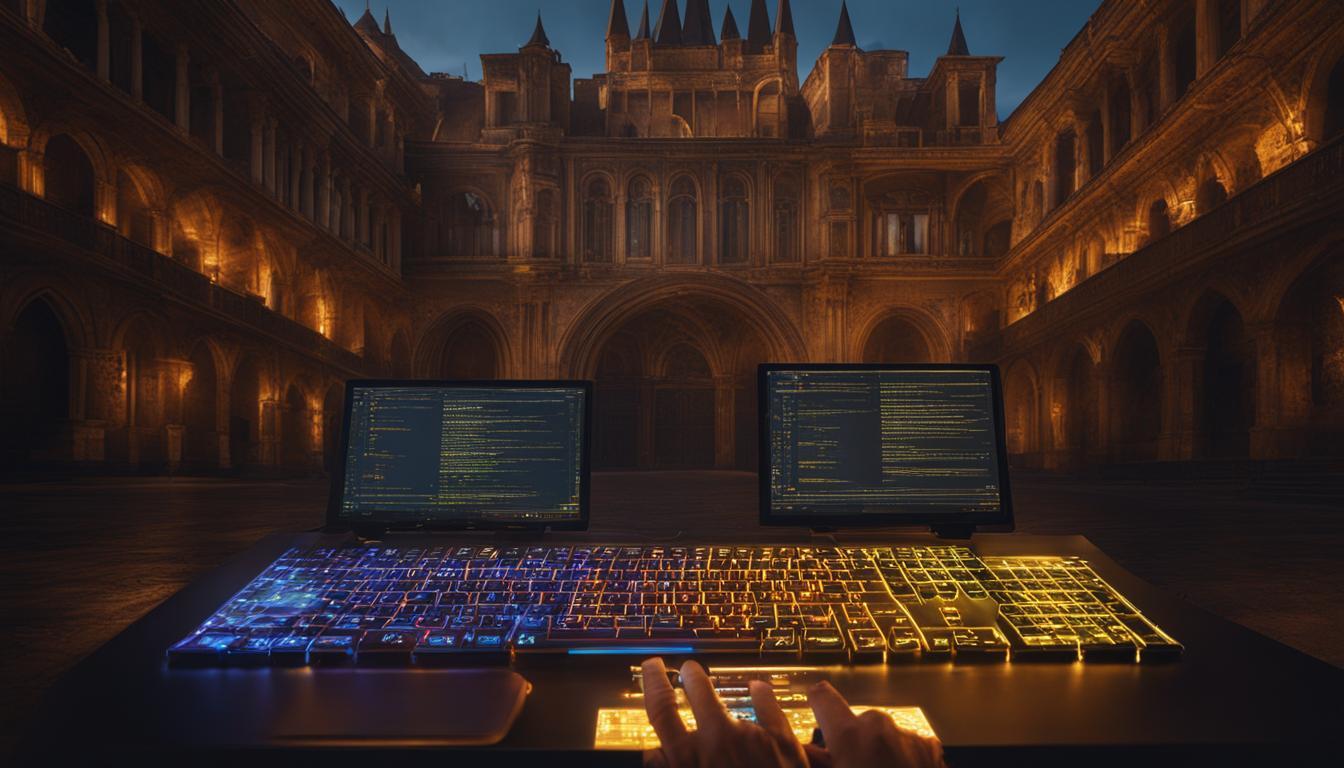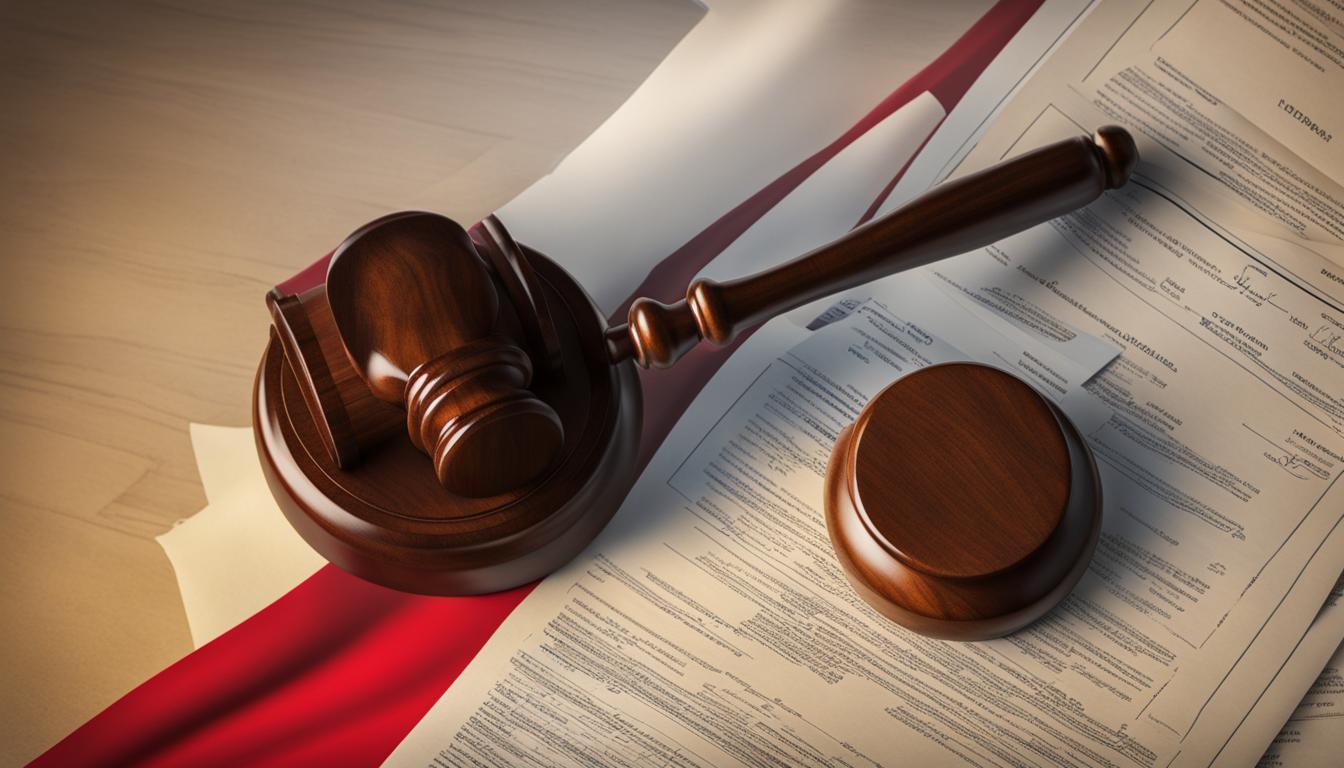Romania’s Legal Framework for Software Copyright
Romania’s Legal Framework for Software Copyright: Protecting Your Code From Start to Finish
When it comes to software copyright protection in Romania, it’s crucial to understand the legal framework that safeguards your code.
Romania has established robust copyright laws and regulations specifically tailored to protect software intellectual property.
By familiarizing yourself with these regulations, you can ensure the proper protection of your code throughout its lifecycle.
In this article, we will explore the key aspects of Romania’s legal framework for software copyright, including licensing, enforcement, and intellectual property rights.
We will also delve into the terminology surrounding computer programs and databases, as well as the different types of software eligible for copyright protection.
Additionally, we’ll discuss the international and European regulations that Romania adheres to, as well as the role of the Romanian Copyright Office in managing and protecting software copyrights.
Furthermore, we will explore the enforcement mechanisms available for copyright holders, including civil and criminal procedures. Understanding these mechanisms is crucial for effectively combating copyright infringement and protecting your software.
We’ll also provide best practices for software copyright protection in Romania, including technical and contractual measures to safeguard your code from unauthorized use.
Finally, we’ll touch upon recent developments in software copyright in Romania and discuss the future outlook for copyright protection.
We’ll also examine case studies on copyright infringement to highlight the importance of robust protection strategies.
If you require legal assistance in navigating the complexities of software copyright in Romania, we’ll guide you on seeking the expertise of experienced lawyers and law offices.
Stay tuned as we delve into Romania’s legal framework for software copyright, equipping you with the knowledge you need to protect your code and maximize its potential in the Romanian market.
Understanding the Terminology: Computer Programs and Databases
When it comes to software copyright in Romania, it is essential to have a clear understanding of the terminology used.
Computer programs, which are the focus of software copyright, can be broadly classified into two categories: operating software and application software.
Operating software refers to the programs that manage the computer’s hardware and provide a platform for other software to run.
On the other hand, application software refers to the programs that perform specific tasks or functions, such as word processors, spreadsheets, or video editing software.
These programs are designed to be user-friendly and address specific needs.
It is important to note that computer programs often rely on databases to function effectively.
Databases provide a means of storing and organizing large amounts of information or data that is necessary for the software to operate.
Databases can be protected by copyright laws as well, as they are considered to be original creations.
Understanding the relationship between computer programs and databases is crucial when seeking copyright protection for software in Romania.
Software Patents in Romania
While software copyright protects the expression of ideas, software patents protect the underlying inventions or technical solutions embodied in the software.
In Romania, it is important to note that software as such is not eligible for patent protection.
However, if a software invention meets the criteria of novelty, inventive step, and industrial applicability, it may be eligible for patent protection.
This means that software inventions that have a technical character or solve a technical problem may be eligible for patent protection in Romania.
Software developers and companies should consider both copyright and patent protection when seeking comprehensive intellectual property rights for their software.
Copyright protection safeguards the code and the expression of ideas, while patent protection offers additional protection for the technical aspects and inventions embodied in the software.
Key Points:
- Computer programs can be classified into operating software and application software.
- Databases are an essential component of many computer programs and can also be protected by copyright laws.
- Software patents are available in Romania for software inventions that meet certain criteria.
| Aspect | Computer Programs | Databases | Software Patents |
|---|---|---|---|
| Definition | Sets of instructions used with computers to achieve specific results | Means of storing and organizing information or data | Technical solutions or inventions embodied in software |
| Classification | Operating software and application software | N/A | N/A (Software as such is not patentable) |
| Copyright Protection | Yes | Yes | No (Protected by copyright) |
| Patent Protection | No | No | Yes (For software inventions that meet certain criteria) |
Types of Software: Standard and Custom

In Romania, software programs can be broadly classified into two types: standard software and custom software.
Understanding the distinction between these types is essential for software developers and companies seeking copyright protection for their creations.
Standard software refers to commercially available programs that are usually provided through licensing agreements.
These programs are developed for a wide range of users and are typically accessible online or installed on user workstations.
Standard software is designed to meet the needs of a broad user base and may offer a variety of features and functionalities.
Common examples include operating systems, productivity suites, and computer games.
Custom software, on the other hand, is developed specifically for individual users or organizations.
It is tailored to meet their unique requirements and address specific business processes or challenges.
Custom software is typically commissioned by a client and developed by a software development team.
It offers personalized functionalities and can be designed to integrate with existing systems.
Common examples include enterprise resource planning (ERP) software, customer relationship management (CRM) applications, and specialized industry-specific software.
Comparison of Standard and Custom Software
| Criteria | Standard Software | Custom Software |
|---|---|---|
| Licensing | Usually provided through licensing agreements | Developed and owned by the client |
| Functionality | Offers a broad range of features for general use | Customized to meet specific user requirements |
| Development | Developed by software companies for sale to multiple users | Commissioned by a client and developed by a software development team |
| Cost | Lower initial cost due to economies of scale | Higher initial cost due to development from scratch |
| Maintenance | Vendor responsible for updates and bug fixes | Client responsible for updates and maintenance |
| Support | Vendor provides technical support and documentation | Client may receive support from the development team |
Both standard and custom software are eligible for copyright protection in Romania.
It is important for software developers and copyright holders to understand the specific rights and licensing agreements associated with each type.
By considering the unique characteristics of standard and custom software, developers can make informed decisions regarding copyright protection, licensing, and the management of their intellectual property.
International and European Regulations
Romania is committed to protecting copyright and intellectual property rights in accordance with international and European regulations.
The country is a signatory to the Berne Convention, which sets the international standards for copyright protection.
Additionally, Romania has implemented the TRIPS Agreement, which provides a framework for the enforcement of intellectual property rights.
At the European level, Romania has transposed relevant directives into its national legislation to ensure compliance with EU copyright laws.
Directive 2009/24/EC focuses specifically on the legal protection of computer programs, while Directive 96/9/EC addresses the legal protection of databases.
These directives establish the principles and standards for copyright protection in the digital era.
By adhering to these international and European regulations, Romania aims to create a strong legal framework that encourages innovation, protects intellectual property rights, and fosters a fair and competitive marketplace for software developers and copyright holders.
| International Regulations | European Regulations |
|---|---|
|
|
Copyright Enforcement and Licensing

The protection of software copyright in Romania extends beyond legal frameworks and includes mechanisms for enforcement and licensing.
Understanding these aspects is crucial for copyright holders to safeguard their rights and prevent infringement.
Enforcement
In Romania, copyright enforcement is a dual process involving civil and criminal proceedings.
Copyright holders have the option to initiate civil actions to seek recognition of their copyright, claim damages, and request injunctions to prevent further infringement.
The courts have the authority to order the removal or destruction of infringing copies of software and the seizure of assets involved in the infringement.
In cases of copyright infringement, criminal liability can also be imposed on the infringers.
Penalties for copyright infringement in Romania include fines and imprisonment, providing a robust deterrent against unauthorized use and distribution of copyrighted software.
These enforcement mechanisms empower copyright holders to protect their intellectual property rights effectively.
Licensing
Licensing is another important aspect of software copyright protection in Romania.
Copyright holders can grant licenses that allow others to use their copyrighted software under specific terms and conditions. Licensing agreements may detail authorized usage, restrictions, royalties, and any other relevant terms.
By licensing their software, copyright holders can control how their creations are used, ensure proper compensation, and maintain a competitive edge in the market.
It is essential to draft clear and comprehensive licensing agreements to avoid any misunderstandings and protect the integrity of the copyrighted software.
The Role of the Romanian Copyright Office
The Romanian Copyright Office (RCO) plays a vital role in the protection and management of software copyrights in Romania.
As the regulatory authority responsible for supervising and authorizing copyright and related rights, the RCO ensures the proper registration and enforcement of software copyrights.
By overseeing national registers and conducting investigations, the RCO provides a centralized platform for copyright holders to safeguard their intellectual property.
The RCO offers a range of services to software developers and copyright holders, including arbitration for copyright disputes.
Through its arbitration services, the RCO provides an alternative to litigation, allowing parties to resolve conflicts in a more efficient and cost-effective manner.
This can be particularly beneficial for small businesses and individuals seeking to protect their software copyrights.
Main Services Provided by the Romanian Copyright Office:
- Registration of copyrights for software and related works
- Management of national copyright registers
- Investigation and enforcement of copyright infringements
- Arbitration services for copyright disputes
Software developers and copyright holders should utilize the services offered by the RCO to ensure the proper management, protection, and enforcement of their intellectual property rights.
By registering their software copyrights with the RCO, they can establish a legal record of ownership and strengthen their position in case of any copyright disputes or infringements.
Derogations and Specific Provisions
When it comes to software copyright in Romania, there are specific provisions and derogations that need to be taken into account.
These provisions focus on the processing of personal data for the prevention, detection, investigation, and prosecution of criminal offenses.
While copyright protection is crucial, it needs to be balanced with the need for law enforcement and security measures.
The Romanian Copyright Law recognizes the importance of protecting personal data while ensuring the enforcement of copyright laws.
It is essential for software developers and companies to be aware of these specific provisions and ensure compliance with both copyright laws and data protection regulations.
By collecting and processing personal data responsibly, software developers can meet legal requirements and continue to protect their intellectual property rights.
By respecting the specific provisions and derogations set forth in the Romanian Copyright Law, software developers can navigate the complex landscape of copyright protection in Romania.
It is important to stay informed about any updates or changes in legislation related to software copyright and data protection to maintain compliance and mitigate potential risks.
Overall, software copyright protection in Romania requires a comprehensive understanding of both copyright laws and data protection regulations.
By staying informed and up to date with the specific provisions and derogations, software developers and companies can ensure the proper protection of their intellectual property rights and maintain compliance with relevant legal requirements.
Recent Developments and Future Outlook
In recent years, Romania has witnessed significant developments in the field of software copyright, with legislative amendments aimed at strengthening copyright protection and combating software piracy.
These measures reflect the country’s commitment to creating a robust legal framework that safeguards the rights of software developers and copyright holders.
One notable development is the introduction of stricter penalties for copyright infringement in Romania.
The government has recognized the detrimental impact of piracy on the software industry and has taken steps to deter such illegal activities.
Under the revised copyright laws, individuals found guilty of software piracy can face substantial fines and even imprisonment, serving as a deterrent to potential infringers.
Looking ahead, the future of software copyright in Romania appears promising.
The government is actively working towards adapting to new technologies and keeping pace with advancements in the digital landscape.
Efforts are being made to strengthen the enforcement of copyright laws, increase public awareness about the importance of intellectual property rights, and foster a culture of respect for software copyrights.
Furthermore, collaborations between law enforcement agencies, software industry associations, and copyright holders are being forged to combat software piracy effectively.
These partnerships aim to streamline reporting mechanisms, enhance legal enforcement capabilities, and create a safer marketplace for software developers and copyright holders.
By working together, stakeholders in Romania’s software industry can effectively protect their intellectual property and contribute to a thriving and innovative digital ecosystem.
Table: Copyright Infringement Penalties in Romania
| Penalty | Description |
|---|---|
| Fines | Individuals found guilty of software piracy can face fines ranging from several thousand to several million Romanian Leu, depending on the severity of the infringement. |
| Imprisonment | For serious cases of copyright infringement, individuals can be sentenced to imprisonment for a period ranging from six months to several years. |
| Asset Seizure | Courts have the power to order the seizure of assets involved in copyright infringement, including computers, servers, and other equipment used in the unauthorized distribution or reproduction of software. |
| Damages | Copyright holders can seek compensation for the damages caused by software piracy, including loss of revenue, reputational damage, and legal expenses. |
Case Studies on Copyright Infringement
Understanding real-life case studies can provide valuable insights into the consequences and outcomes of copyright infringement in Romania.
These examples highlight the importance of robust copyright protection for software and the legal remedies available to copyright holders.
Case Study 1: XYZ Software Company vs. Piracy Networks
In this landmark case, XYZ Software Company successfully took legal action against several piracy networks operating in Romania. The company discovered that its software was being illegally distributed and sold without authorization, leading to significant financial losses.
By collaborating with law enforcement authorities and engaging experienced legal professionals, XYZ Software Company was able to identify the perpetrators and initiate civil proceedings.
The court ruled in favor of the company, ordering the immediate cessation of the unauthorized distribution and imposing financial penalties on the infringers.
This case serves as a clear example of the importance of swift and decisive action in protecting software copyrights.
Case Study 2: ABC Developer vs. Former Employee
In this case, ABC Developer discovered that a former employee had misappropriated their proprietary software code and used it to develop a competing product.
The developer filed a lawsuit, alleging copyright infringement and breach of employment contract.
The court scrutinized the evidence presented, including code comparisons, employment agreements, and non-disclosure agreements. The former employee was found liable for copyright infringement, leading to substantial damages awarded to ABC Developer.
This case emphasizes the significance of comprehensive employment contracts and the need for clear intellectual property protection clauses to safeguard software copyrights.
Case Study 3: PQR Corporation vs. Counterfeit Software Vendors
PQR Corporation, a multinational software company, faced a significant challenge when counterfeit versions of its software began flooding the Romanian market.
These illicit copies not only undermined the company’s reputation but also resulted in substantial financial losses.
PQR Corporation collaborated with the Romanian authorities, engaging in joint operations to identify and seize counterfeit software vendors.
The subsequent legal proceedings resulted in convictions, hefty fines, and the destruction of counterfeit copies.
This case highlights the importance of proactive anti-counterfeiting measures and the role of collaboration between copyright holders and law enforcement agencies.
| Case Study | Outcome |
|---|---|
| XYZ Software Company vs. Piracy Networks | Successful legal action, cessation of unauthorized distribution, financial penalties imposed on infringers |
| ABC Developer vs. Former Employee | Former employee found liable for copyright infringement, substantial damages awarded to ABC Developer |
| PQR Corporation vs. Counterfeit Software Vendors | Collaboration with authorities led to convictions, hefty fines, and the destruction of counterfeit copies |
These case studies highlight the need for software developers and copyright holders to be vigilant in protecting their intellectual property rights.
By understanding the legal processes involved and working closely with legal professionals, individuals and companies can take appropriate measures to prevent and combat copyright infringement in Romania.
Best Practices for Software Copyright Protection in Romania
When it comes to ensuring effective copyright protection for your software in Romania, it is essential to follow best practices that safeguard your intellectual property rights.
By implementing the following measures, you can protect your software from unauthorized use, maintain accurate records, and stay updated on copyright laws and regulations.
1. Technical and Contractual Measures
Table
| Measures | Benefits |
|---|---|
| Use encryption and access controls | Prevents unauthorized access and protects your source code |
| Implement digital rights management (DRM) | Ensures only authorized users can access and use your software |
| Include copyright notices and terms of use in your software | Establishes your ownership and sets out usage rights and restrictions |
Implementing technical measures such as encryption, access controls, and DRM can significantly enhance the security of your software and protect it from piracy or unauthorized distribution.
Additionally, including copyright notices and terms of use in your software clarifies your ownership and the rights and limitations associated with its use.
2. Accurate Record-Keeping
Maintaining accurate records of your intellectual property rights is crucial for software copyright protection.
This includes documenting the creation and development process, as well as any modifications or updates.
Keeping detailed records not only serves as evidence of ownership but also provides you with a comprehensive overview of your software’s history, enabling you to defend your copyrights if necessary.
3. Stay Updated and Educate
Constantly staying informed about copyright laws and regulations is vital to protecting your software copyrights.
Regularly review and update your knowledge of Romanian copyright legislation and international standards.
Additionally, educating your employees and users about copyright infringement and piracy can help create a culture of respect for intellectual property and deter unauthorized use.
By following these best practices, you can strengthen your software copyright protection in Romania and ensure that your intellectual property remains secure.
Remember to consult legal professionals specialized in copyright law for specific advice and guidance tailored to your unique circumstances.
Seeking Legal Assistance for Software Copyright Protection
When it comes to protecting your software copyrights in Romania, it is crucial to seek legal assistance from experienced Romanian lawyers or law offices.
Our team of Romanian lawyers can provide expert advice on various aspects of software copyright protection, including copyright registration, drafting licensing agreements, enforcement actions, and resolving copyright disputes.
By engaging the services of a reputable Romanian law office, you can have peace of mind knowing that your software copyrights are in capable hands.
Our legal professionals will work closely with you to understand your specific needs and develop tailored strategies to protect your intellectual property rights.
Whether you are a software developer or a copyright holder, partnering with a Romanian lawyer or law office can significantly enhance the overall protection of your software copyrights and safeguard your creations in the Romanian marketplace.
Software Copyright in Romania – FAQ
1. What is the legal framework for software copyright in Romania?
In Romania, the legal framework for copyright and protection of computer programs is primarily governed by the national legislation, while also taking into account relevant international agreements and directives of the European Union.
The protection of intellectual property rights for computer programs is in accordance with the directive and agreement set by the European Parliament and the Council.
2. What does the legal protection of computer programs entail in Romania?
The legal protection of computer programs in Romania encompasses the economic rights and the right to use as per the Berne Convention and other international treaties.
This includes the right to authorise use, import, and export, as well as the protection of literary and artistic aspects of computer programs under the Copyrights and Neighboring Rights statutory provisions.
3. How is software copyright protection granted in Romania?
In Romania, copyright protection for computer programs is granted under the Romanian national legislature, considering the principles outlined in the Berne Convention for the Protection of literary and artistic works.
This includes granting moral rights and statutory protection for the legal protection of computer programs in accordance with the Civil Code.
4. Are patents applicable to software in Romania?
While patent protection is available for technological inventions, including computer programs, the scope and applicability of patent law for computer programs is guided by the patent law specific to Romania and the regulations set forth by the World Intellectual Property.

